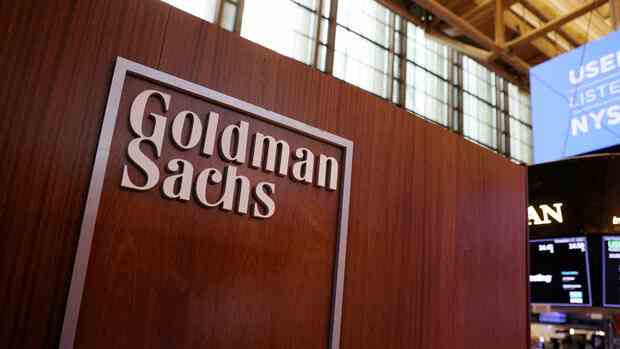According to Nishi Somaiya, Goldman Sachs examines more than 5,000 investment opportunities each year and then selects the best 20 to 30 worldwide.
(Photo: Reuters)
Frankfurt For the first time in years, the global private equity market has had to contend with difficult framework conditions. Rising interest rates are making alternatives to private equity and growth capital more attractive again, and institutional investors such as insurers and pension funds are investing more heavily in government bonds. Added to this is the economic slowdown, which is affecting the portfolio companies of the funds.
In the middle of this difficult phase, Goldman Sachs Asset Management has now successfully closed the “West Street Global Growth Partners” fund with a volume of 5.2 billion dollars. The fund exceeded its initial fundraising target, with backers from institutional and private investors, as well as Goldman Sachs itself and its employees.
Growth capital is provided for minority interests in rapidly expanding companies in the early stages of corporate development, while private equity funds typically acquire controlling and controlling interests in more mature companies.
Nishi Somaiya, co-head of Goldman Sachs Asset Management’s global growth equity business, sees good opportunities for investments in the German market. “Germany is a very attractive market for growth investments. The country’s industrial strength produces many interesting Industry 4.0 players from areas such as automation software and robotics solutions. Germany has a long track record of building global champions on the basis of a highly decentralized economy,” the expert told Handelsblatt.
But she also recognizes some shortcomings. “Compared to France or the UK, Germany has a more decentralized economy with multiple but smaller digital hubs. This leads to weaker network effects and can also slow down the pace of development,” says Somaiya.
Young German entrepreneurs often do not think globally enough
The country’s large domestic economy partially reduces the need for founders to internationalize in order to build critical mass. There is therefore still great potential for some of these promising companies to expand and address a global customer base.
Since the valuations of young tech companies have fallen in recent months, there will again be opportunities to invest in promising companies at more attractive conditions. Software companies in particular paid very high prices during the boom times.
According to the analysis company Preqin, alternative asset classes are facing major challenges – among other things, launching new funds is likely to be more difficult than before because lenders are investing in interest-bearing securities again.
Still, assets under management will grow from $13.7 trillion at the end of 2021 to $23.3 trillion in 2027, according to Preqin. Because the return expectations are still good, the annual growth rate will be a good nine percent.
Companies have so far been hesitant about 2023
According to Somaiya, Goldman Sachs examines more than 5,000 investment opportunities each year and then selects the best 20 to 30 worldwide. “Looking at our pipeline, there were fewer options going into 2023 as many companies continue to wait for an improving valuation environment before raising capital, but it’s still early in the year.”
The US investment bank sees alternative investments away from the traditional stock exchanges as a growth market. According to its own statements, the Wall Street house is the fifth largest asset manager for alternative investments worldwide with a total volume of more than 263 billion dollars.
The new fund will be managed by Goldman Sachs Asset Management’s growth equity arm, which is led by Darren Cohen, Nishi Somaiya and Stephanie Hui from New York, London and Hong Kong.
The new fund will target minority investments in companies averaging $50 million. He uses the “GS Value Accelerator” operating platform. It comprises a global network of operational consultants and experts who can support companies with digital transformation, for example.
The growth fund has already invested, including in Alphasense (software), Exotec (robot-based warehouse systems), Fortanix (security platform), Locus Robotics (warehouse automation), Megarobo (Chinese provider of robot-based life sciences solutions), Starling Bank and Xempus, a German distribution platform for company pension schemes and life insurance.
More: Despite global slump – investors rely on German robotics
